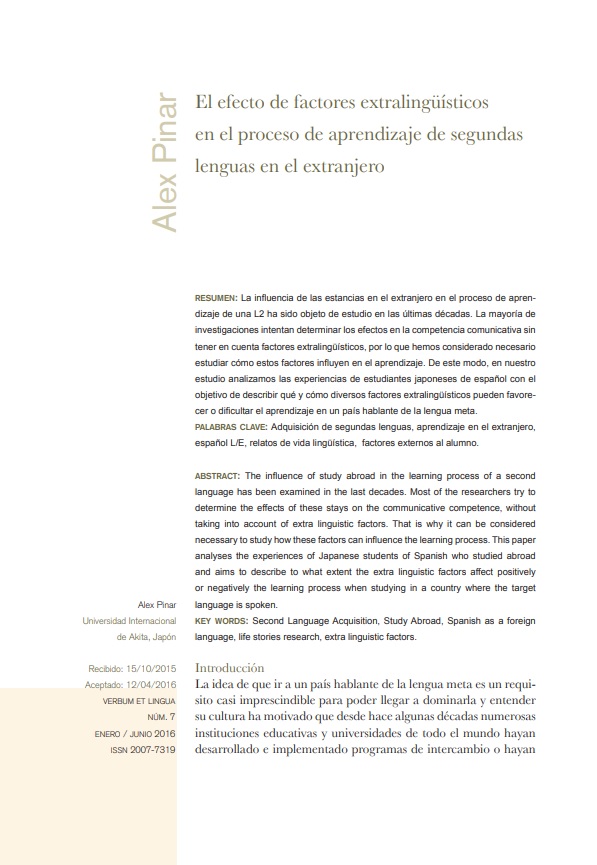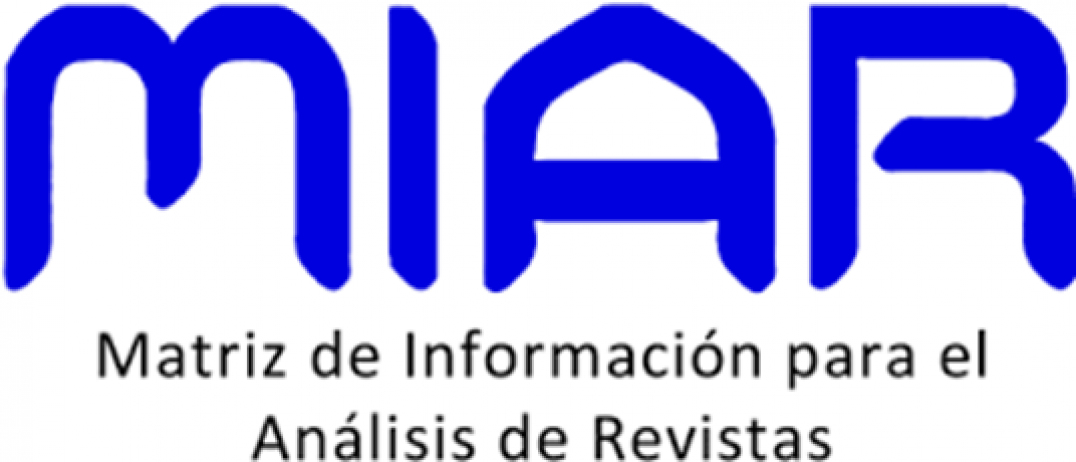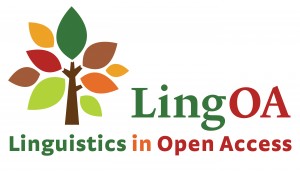El efecto de factores extralingüísticos en el proceso de aprendizaje de segundas lenguas en el extranjero
DOI:
https://doi.org/10.32870/vel.vi7.71Palabras clave:
Adquisición de segundas lenguas, aprendizaje en el extranjero, español L/E, relatos de vida lingüística, factores externos al alumnoResumen
La influencia de las estancias en el extranjero en el proceso de aprendizaje de una L2 ha sido objeto de estudio en las últimas décadas. La mayoría de investigaciones intentan determinar los efectos en la competencia comunicativa sin tener en cuenta factores extralingüísticos, por lo que hemos considerado necesario estudiar cómo estos factores influyen en el aprendizaje. De este modo, en nuestro estudio analizamos las experiencias de estudiantes japoneses de español con el objetivo de describir qué y cómo diversos factores extralingüísticos pueden favorecer o dificultar el aprendizaje en un país hablante de la lengua meta.
Descargas
Métricas
Citas
Allen, H., Dristas, V. y Mills, N. (2006) Cultural learning outcomes and summer study abroad. En Mantero, M. (Ed.)
Identity and second language learning: Culture, inquiry, and dialogicactivity in educational contexts. Charlotte, NC: Information Age Publishing. Pp. 189-215
Berg, M. V. (2009) Intervening in student learning abroad: a research-based inquiry. En Intercultural Education, núm. 20 (sup1). Pp. 15-27
Bolívar, A. Domingo, J. y Fernández, M. (2001) La investigación biográfico-narrativa en educación enfoque y metodología. Madrid: La Muralla 180 Alex Pinar. El efecto de factores extralingüísticos en el proceso de aprendizaje...
Campbell, R. (2011) The impact of study abroad on Japanese language learners’ social networks. En New Voices, núm. 5. Pp. 25-63
Churchill, E. y DuFon, M. (2006) Evolving Threads in Study Abroad Research. En Language Learners in Study Abroad Contexts. Clevedon: Multilingual Matters. Pp. 1-27
Churchill, E. (2006) Variability in the Study Abroad Classroom and Learner Competence. En Dufon, M.A y Churchill, E. (Eds.) Language learners in study abroad contexts. Clevedon: Multilingual Matters. Pp. 203-227
Coleman, J. y Chafer, T. (2010) Study abroad and the Internet: physical and virtual context in an era of expanding telecommunications. En Frontiers: The Interdisciplinary Journal of Study Abroad, XIX. Pp. 151–167.
Coleman, J. (2013a). Researching whole people and whole lives. En Kinginger, C. (Ed.) Social and Cultural Aspects of Language Learning in Study Abroad. Language Learning & Language Teaching. Amsterdam/Philadelphia: John Benjamins. Pp. 17-44
Coleman, J. (2013b) Dymplexity: new theories, new contexts and new labels for mobile students. En Journal of Multicultural Discourses, núm. 8(1). Pp. 20-28
Collentine, J y Freed, B. (2004) Learning context and its effects in second language acquisition. En Studies in second language acquisition, núm. 26. Pp. 153-171
DuFon, Margaret A. (2006) The Socialization of Taste during Study Abroad in Indonesia. En DuFon, M. y Churchill, E. (Eds.) Language learners in study abroad contexts. Clevedon, UK: Multilingual Matters. Pp. 91-119
Dwyer, M. (2004a) More Is Better: The Impact of Study Abroad Program Duration. En Frontiers: The Interdisciplinary Journal of Study Abroad, núm. 10. Pp. 151-163
Dwyer, M. (2004b) Charting the impact of studying abroad. En Inter national Educator, núm. 13(1). Pp.14- 17
Engle, L., y Engle, J. (2004) Assessing Language Acquisition and Intercultural Sensitivity Development in Relation to Study Abroad Program Design. En Frontiers: The Interdisciplinary Journal of Study Abroad, núm. 10. Pp. 219-236
Freed, B., Segalowitz, N., y Dewey, D. (2004) Context of learning and second language fluency in French: Comparing regular classroom, study abroad, and intensive domestic immersion programs. En Studies in Second Language Acquisition, núm. 26(2). Pp. 275-301
Isabelli-García, C. (2006) Study abroad social networks, motivation and attitudes: Implications for second language acquisition. En DuFon M. y Churchill, E. (Eds.) Language learners in study abroad contexts. Clevedon: Multilingual Matters. Pp. 231-258
Jackson, J. (2006) Ethnographic pedagogy and evaluation in short-term study abroad. En Byram, M. y Feng, A. (Eds.) Living and study abroad: Research and practice, Vol. 12. Multilingual Matters. Pp. 134- 156
Jackson, J. (2009) Intercultural learning on short-term sojourns. En Intercultural Education, núm. 20(sup1). Pp. 59-71
Kinginger, C. (2008) Language Learning in Study Abroad: Case Studies of Americans in France. En Modern Language Journal. Pp. 92 núm. 7 / enero-junio / 2016 181
Knight, S. M., y Schmidt-Rinehart, B. (2002) Enhancing the Homestay: Study Abroad from the Host Family’s Perspective. En Foreign Language Annals, núm. 35. Pp. 190-201
Knight, S., y Schmidt-Rinehart, B. (2010) Exploring conditions to enhance student/ host family interaction abroad. En Foreign Language Annals, núm. 43. Pp. 64-71
Lafford, B. (2006) The effects of Study Abroad vs. Classroom Contexts on Spanish SLA: Old Assumptions, New Insights and Future Research Directions. En Klee y Face (Eds). Selected Proceedings of the 7th Conference on the Acquisition of Spanish and Portuguese as First and Second Languages. Somerville, MA: Cascadilla Proceeding Project. Pp. 1-25
Lafford, B. Collentine, J. (2006) The effects of study abroad and classroom contexts on the acquisition of Spanish as a second language: From research to application. En Lafford, B. y Salaberry, R. (Eds.). Spanish Second Language Acquisition: From Research Findings to Teaching Applications. Washington, DC: Georgetown University Press. Pp. 103-126
Magnan, S. y Lafford, B. (2012) Learning through immersion during study abroad. En Gass, S. y Mackey, A. (Eds.). The Routledge handbook of second language acquisition. New York: Routledge.
Mcmeekin, A. (2006)“Negotiation in a Japanese study abroad settings. En DuFon M. y Churchill E. (Eds.). Language learners in study abroad contexts. Clevedon: Multilingual Matters. Pp.177-202
Medina-Lopez-Portillo, A. (2004) Intercultural Learning Assessment: The Link between Program Duration and the Development of Intercultural Sensitivity. En Frontiers:The Interdisciplinary Journal of Study Abroad, núm, 10. Pp.179-199
Palou, J y Fons, M. (2010) Els relats de vida lingüística en els processos de formació dels docents. En Historia de vida en educación: biografías en contexto. Barcelona: Esbrina-Recerca 4. Pp.108-115
Schmidt-Rinehart, B. y Knight, S. (2004) The homestay component of study abroad: Three perspectives. En Foreign Language Annals, núm. 37(2). Pp. 254-262
Segalowitz, N. y Freed, B. F. (2004). Context, contact, and cognition in oral fluency acquisition: Learning Spanish in at home and study abroad contexts. En Studies in Second Language Acquisition, núm. 26. Pp. 173-199
Shively, R. L., & Cohen, A. D. (2008) Development of Spanish requests and apologies during study abroad. En Íkala, revista de lenguaje y cultura, núm. 13(20). Pp. 57-118














